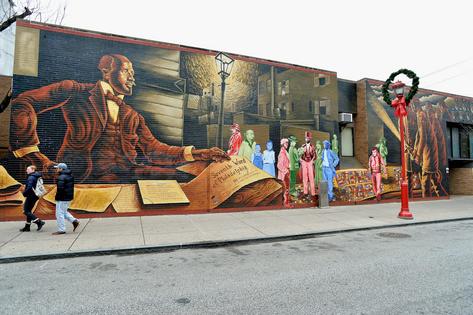Philadelphia continues long history of Black-led protest meetings aimed at fighting racial inequity and prejudice
Published in Political News
A meeting in Philadelphia, held at a senior center on a bitter cold Saturday afternoon in late January 2025, drew nearly 300 people.
They came for two key reasons.
One was to voice outrage at the upsurge in policies and proposals nationwide that attack the advances of African Americans – many of which were secured in part through 1960s-era civil rights protests.
The other was to begin to develop a “Black agenda” to counter those attacks in Philadelphia.
In gathering communally to voice their concerns, attendees continued a legacy of Black-led protest meetings that spans over two centuries in the city.
I am a professor of journalism at Temple University and a reporter who has covered racial inequities in America and abroad for 50 years. I was invited to attend the Philadelphia meeting to talk about the history of protest meetings in the city.
That’s a history of successes and shortfalls that helped shape both Philadelphia and the nation.
Over 200 years ago, what is considered the first mass protest meeting ever held in the United States by African Americans took place in Philadelphia.
That little-known meeting, held in January 1817, drew 3,000 African Americans to Philadelphia’s historic Mother Bethel AME Church. The attendees came to denounce efforts by the American Colonization Society to relocate free Black Americans to a colony in West Africa. That group, with a predominately white membership that included prominent politicians and preachers, believed free Blacks could not be integrated into white America.
The attendees at Mother Bethel in 1817 saw relocation as a forced removal of Black Americans from the homeland they supported as patriotically as white Americans. The unanimous opposition that attendees expressed helped change the stance of local Black leaders, such as Mother Bethel founder Richard Allen, from lukewarm supporters of relocation to opponents.
The tradition of mass meetings to address the adversity impacting Philadelphia’s African American community continued from the 19th century into the 20th and now the 21st century.
The results have been mixed.
For example, after members of the Pennsylvania state legislature proposed inserting a white-males-only voting restriction into the state’s constitution in 1838, denying voting rights for free Black men, Black Philadelphians held mass meetings to demand the provision be deleted.
But those demands failed. Pennsylvania restricted voting to white men until 1870 when ratification of the 15th Amendment to the U.S. Constitution granted African American men the right to vote.
However, mass meetings during the 1860s that had an agenda to desegregate trolleys in Philadelphia were successful. A law signed in 1867 banned segregated seating on public transit statewide.
Renowned scholar and civil rights activist W.E.B. Du Bois credited “public meetings and repeated agitation” for that statewide ban in his seminal 1899 book “The Philadelphia Negro: A Social Study.”
Demands to end police brutality have been the focus of mass meetings in the city at least since the 1918 formation of Philadelphia’s now-defunct Association for the Protection of Colored People. Abusive policing practices that continue in Philadelphia to this day point to a shortfall in fulfilling those demands.
And yet, momentum from the key agenda item of mass meetings in the early 1970s – to increase political power – ultimately led to the election of the city’s first Black mayor, Wilson Goode, in 1983.
Since 1817, Black-led protest meetings in Philadelphia have sought to end discrimination against African Americans. That consistent goal remains unrealized.
The first national political conventions that African Americans staged in the U.S., beginning in September 1830, castigated discrimination. Convention attendees in 1831 sought an end to cruel and oppressive laws devised to disadvantage free Blacks.
Nearly 150 years later, the “Human Rights Agenda” developed during a Philadelphia mass meeting in December 1978 and later the report from Philadelphia’s 2015 Black Political Summit Coalition both decried racial prejudice against African Americans.
An observation that Du Bois made in “The Philadelphia Negro” about discrimination against African Americans in the so-called City of Brotherly Love retains contemporary relevance.
Race prejudice “is a far more powerful social force than most Philadelphians realize,” Du Bois wrote. Most white Philadelphians, he noted, “are quite unconscious” regarding the prejudice that impacts Black residents. Their impulse is emphatically to deny such discrimination.
Such denial allowed prejudice to persist then – and today.
To begin to develop a new Black agenda, the organizers of the meeting at the senior center collected suggestions that attendees filed on note cards. They promised to publicly announce an action plan that is expected to involve economic boycotts and actions to strengthen the economic infrastructure in Philadelphia’s African American community.
Defending rights and progress aroused attendees at that January meeting in 2025 as strongly as denouncing forced colonization aroused attendees at the mass meeting 208 years earlier.
Read more of our stories about Philadelphia.
This article is republished from The Conversation, a nonprofit, independent news organization bringing you facts and trustworthy analysis to help you make sense of our complex world. It was written by: Linn Washington, Jr., Temple University
Read more:
W.E.B. Du Bois’ study ‘The Philadelphia Negro’ at 125 still explains roots of the urban Black experience – sociologist Elijah Anderson tells why it should be on more reading lists
Philly’s Chinatown has a rich tradition of activism – the Sixers arena fight was just one of many to preserve the neighborhood
We interviewed 30 Black public school teachers in Philadelphia to understand why so many are leaving the profession
Linn Washington, Jr. does not work for, consult, own shares in or receive funding from any company or organization that would benefit from this article, and has disclosed no relevant affiliations beyond their academic appointment.





























































Comments